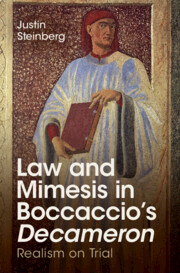
- Publisher:
- Cambridge University Press
- Online publication date:
- August 2023
- Print publication year:
- 2023
- Online ISBN:
- 9781009071130
- Subjects:
- Literature, Area Studies, European Literature, European Studies


In Boccaccio's time, the Italian city-state began to take on a much more proactive role in prosecuting crime – one which superseded a largely communitarian, private approach. The emergence of the state-sponsored inquisitorial trial indeed haunts the legal proceedings staged in the Decameron. How, Justin Steinberg asks, does this significant juridical shift alter our perspective on Boccaccio's much-touted realism and literary self-consciousness? What can it tell us about how he views his predecessor, Dante: perhaps the world's most powerful inquisitorial judge? And to what extent does the Decameron shed light on the enduring role of verisimilitude and truth-seeming in our current legal system? The author explores these and other literary, philosophical, and ethical questions that Boccaccio raises in the Decameron's numerous trials. The book will appeal to scholars and students of medieval and early modern studies, literary theory and legal history.
2023 Notable books, Seminary Co-op
'Written with vigor and wit, Justin Steinberg’s book incisively examines how Boccaccio's realism responds to medieval legal procedure. His sophisticated historicist approach both appreciates Boccaccio’s work in its medieval world and highlights points of contact with modern forms of literature and with contemporary concerns. A major contribution to the study of literature, Steinberg’s book will open the Decameron to a new generation of readers.'
David G. Lummus - author of The City of Poetry: Imagining the Civic Role of the Poet in Fourteenth-Century Italy
‘In this ambitious, magnificently realized study of Boccaccian ‘realism' and ‘naturalism' through the lens of the evolving legal culture of his time, Justin Steinberg has achieved something truly rare among the ongoing attempts to synthesize close textual analysis with historical-cultural contextualization: a genuine, many-faceted dialogue between the two, in which neither cedes pride of place to the other, but rather are mutually interpreting. For Steinberg, mimetic representation (as defined by Auerbach and others) is 1on trial' in the Decameron, in the sense that Boccaccio continually probes the possibilities and limitations of representing ‘the real', even as his mimetic practice itself is a trial, the residue of the author's inquisition into the vagaries of human ‘judgment' at both the individual and the institutional level. Among its many specific accomplishments, Mimesis on Trial, unveils the anachronistic emphases of much of contemporary criticism, which has consistently wrenched key Boccaccian problems (notably but by no means exclusively the status of ‘the natural'; the defense of female desire as a triumph of subjectivity; the encounters between individual subjects and legal institutions; and so on) out of their original contexts, thus, paradoxically, losing sight of what makes this text so extraordinarily ‘novel,' such an important marker of, and participant in, the long, uneven process that moves us toward what we are so fond of calling modernity.'
Albert Ascoli - Professor Emeritus at University of California, Berkeley
‘In this highly original book, Justin Steinberg opens our eyes to the pervasive nature of legal culture and its notions of truth as they influenced Boccaccio in his composition of the Decameron. Not only does Boccaccio parody courtroom dramas and legal disputes, but he creates highly unlikely events across the hundred tales that stage the 'human stakes of plausibility.' His characters enact and respond to unrealistic contingencies, dwelling between the world of chance and the fictional construction of the real. Law and Mimesis challenges traditional theories of realism in the Decameron and leaves us with a new understanding of Boccaccio as an author who was trained in law but constantly reckoned with its implications for art. The consequences of Steinberg's analysis are formidable and far-reaching for studies of Boccaccio, law and literature, and genre.'
Kristina M. Olson - George Mason University
‘This brilliant, revisionary account of the history of Western mimesis lays aside what we have ‘long known' about verisimilitude, realism, and law in Boccaccio (and Dante) in favor of original research, and original thought. It impacts understanding not only of ‘the rise of the novel,' but also our current consumption of procedural drama, suspended between ‘the poetics of likelihood' (in TV courtroom argumentations) and the hard fact of the smoking gun. Written open-handedly, and a joy to read, this book grounded in historical inquiry speaks to issues of prime importance in our own troubled, story-driven times. Recommended.'
David Wallace - University of Pennsylvania
 Loading metrics...
Loading metrics...
* Views captured on Cambridge Core between #date#. This data will be updated every 24 hours.
Usage data cannot currently be displayed.